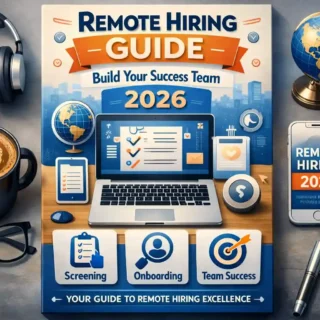In today’s fast-paced business environment, the role of virtual assistants has become increasingly indispensable, offering a myriad of benefits for savvy entrepreneurs and small business owners. As companies seek cost-effective solutions to maximize productivity, hiring a virtual assistant (VA) emerges as a strategic move that enhances operational efficiency. However, navigating the VA hiring process can be daunting without a proper virtual assistant guide. Knowing the right questions to ask virtual assistants during the hiring phase is crucial to ensure a seamless integration into your team.
In this post, we will explore the top virtual assistant skills to look for and best practices for hiring a VA, empowering you with the knowledge to make informed decisions and find a virtual assistant who perfectly fits your business needs.
Growing Importance of Virtual Assistants
As businesses adapt to the digital age, virtual assistants (VAs) have become pivotal in enhancing productivity and ensuring cost-effectiveness. Understanding the dynamics of remote work and the benefits VAs bring is crucial for any growing business.
Rise of Remote Work
The rise of remote work has revolutionized how businesses operate. Remote work offers flexibility and access to a global talent pool. For entrepreneurs, this means the ability to hire a VA from anywhere in the world, ensuring that the right skills are available when needed.
Remote work reduces overhead costs associated with traditional office settings. By eliminating the need for physical office space, companies can redirect resources toward growth initiatives. This shift also promotes a healthier work-life balance for employees, increasing job satisfaction and productivity.
Moreover, remote work encourages a diverse workforce. By hiring from different geographical locations, businesses gain varied perspectives and ideas. This diversity can drive innovation and offer unique solutions to complex challenges.
Real-world examples show that companies embracing remote work see increased employee engagement and retention rates. This strategy fosters a culture of trust and independence, key elements in a modern business environment.
Benefits of Hiring Virtual Assistants
Virtual assistants offer numerous advantages for organizations looking to streamline operations. They handle repetitive tasks, allowing business owners to focus on core activities. One major benefit is cost savings. Since VAs work remotely, companies save on expenses like office space and equipment.
Flexibility is another key advantage. VAs can be hired on an as-needed basis, providing support during peak periods without the long-term commitment of a full-time employee. This adaptability is crucial for startups and small businesses with fluctuating workloads.

VAs bring specialized skills to the table. Whether it’s managing emails, scheduling, or social media, they offer expertise that may not be available in-house. This access to a broad skill set can significantly enhance business efficiency.
Moreover, hiring a VA promotes a global perspective. Businesses can tap into diverse markets by understanding different cultural dynamics, which can be invaluable for global expansion.
Key Questions Before Hiring
Hiring a virtual assistant is a strategic decision that requires careful consideration. Asking the right questions ensures that you find a virtual assistant who fits your business needs.
Importance of Asking Questions
When hiring a virtual assistant, asking the right questions is paramount. It helps in assessing the candidate’s skills and ensures they align with your business requirements. A well-structured virtual assistant guide can streamline this process.
Questions should cover various aspects, from technical skills to cultural fit. This comprehensive approach ensures that the VA can integrate seamlessly into your team. Additionally, it highlights their ability to handle unexpected challenges, a valuable trait in any employee.

Understanding a candidate’s motivation and work style is equally important. By asking about their preferred work environment, you can ensure they will thrive in your company’s culture. This alignment reduces turnover and increases productivity.
Finally, use this opportunity to gauge communication skills. Effective communication is crucial in remote work environments, and asking about their preferred methods and tools can provide insights into their work habits.
Preparing for Interviews
Preparation is key when interviewing potential virtual assistants. A structured interview process ensures you cover all necessary topics and make informed decisions. Here’s a brief guide to get started:
- Identify Key Skills: Determine the top virtual assistant skills needed for your business.
- Develop a Question List: Use resources like this guide to craft your questions.
- Set Up Interviews: Schedule interviews at a time that accommodates different time zones.
- Evaluate Responses: Listen carefully to answers, focusing on both content and delivery.
Before the interview, review the candidate’s resume and background. This preparation allows you to tailor questions to their specific experience, making the interview more relevant and insightful.
During the interview, maintain a conversational tone. This approach puts the candidate at ease and encourages open communication. It also allows you to assess their interpersonal skills, crucial for a remote working relationship.
Post-interview, compare candidates based on their responses and how well they meet your criteria. This evaluation helps in selecting the best fit for your team.
Essential Questions to Ask
Understanding the right questions to ask potential virtual assistants ensures you select a candidate who will effectively contribute to your business’s success.
Task Experience and Expertise
Assessing a virtual assistant’s experience with relevant tasks is essential. Ask about specific projects they have handled and the skills they employed. This information provides insight into their expertise and how it can benefit your operations.
Experience in your industry can be a significant advantage. VAs familiar with your sector are better equipped to handle industry-specific tasks and challenges. This familiarity translates to quicker onboarding and reduced training costs.
Consider asking how they handle task prioritization. Their approach can indicate their organizational skills and ability to work independently. These qualities are crucial for managing workload efficiently, particularly in dynamic environments.
Furthermore, inquire about their problem-solving abilities. Real-world examples of overcoming challenges can highlight their resourcefulness and adaptability, key traits for any successful VA.
Communication Methods and Tools
Effective communication is the backbone of any remote working relationship. When hiring a virtual assistant, it’s vital to discuss their preferred communication methods and tools. This conversation ensures a smooth workflow and mitigates potential misunderstandings.

Communication preferences vary widely among individuals. Some VAs might prefer email for its formality, while others favor instant messaging for quick interactions. Understanding these preferences helps establish a communication plan that suits both parties.
Discuss the technology they are familiar with. Whether it’s project management software like Trello or communication platforms like Slack, their proficiency with these tools can enhance collaboration. This knowledge ensures they can integrate seamlessly with your existing systems.
Inquire about their availability for meetings and updates. Regular check-ins are essential for monitoring progress and addressing issues promptly. A VA who values open communication will likely be more responsive and aligned with your business goals.
Availability and Time Zone Compatibility
When hiring a virtual assistant, aligning on availability and time zone compatibility is crucial. This alignment ensures that tasks are completed promptly and communication is efficient.
Time zone differences can be challenging, particularly if your business operates on a tight schedule. Discuss their working hours and how they align with your needs. Flexibility in their schedule can indicate a willingness to accommodate urgent tasks or meetings.

Consider their approach to handling urgent requests. A VA who can adapt to sudden changes in priorities is invaluable in dynamic business environments. This adaptability ensures that critical tasks are addressed without delay.
Ask about their strategies for managing workload across different time zones. Effective time management is vital in ensuring tasks are completed efficiently. Their method can provide insights into their organizational skills and ability to meet deadlines.
For assistance in finding the right virtual assistant, consider reaching out to a recruitment service like Search Party Recruiting. They offer valuable resources and support in the VA hiring process.












